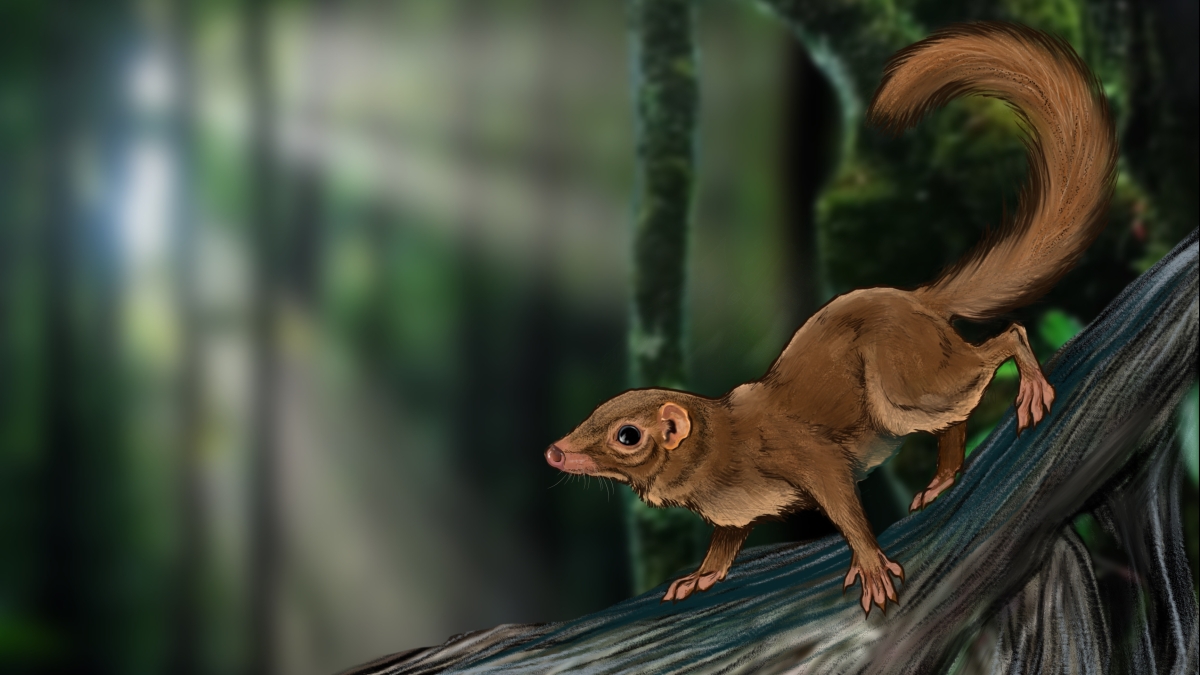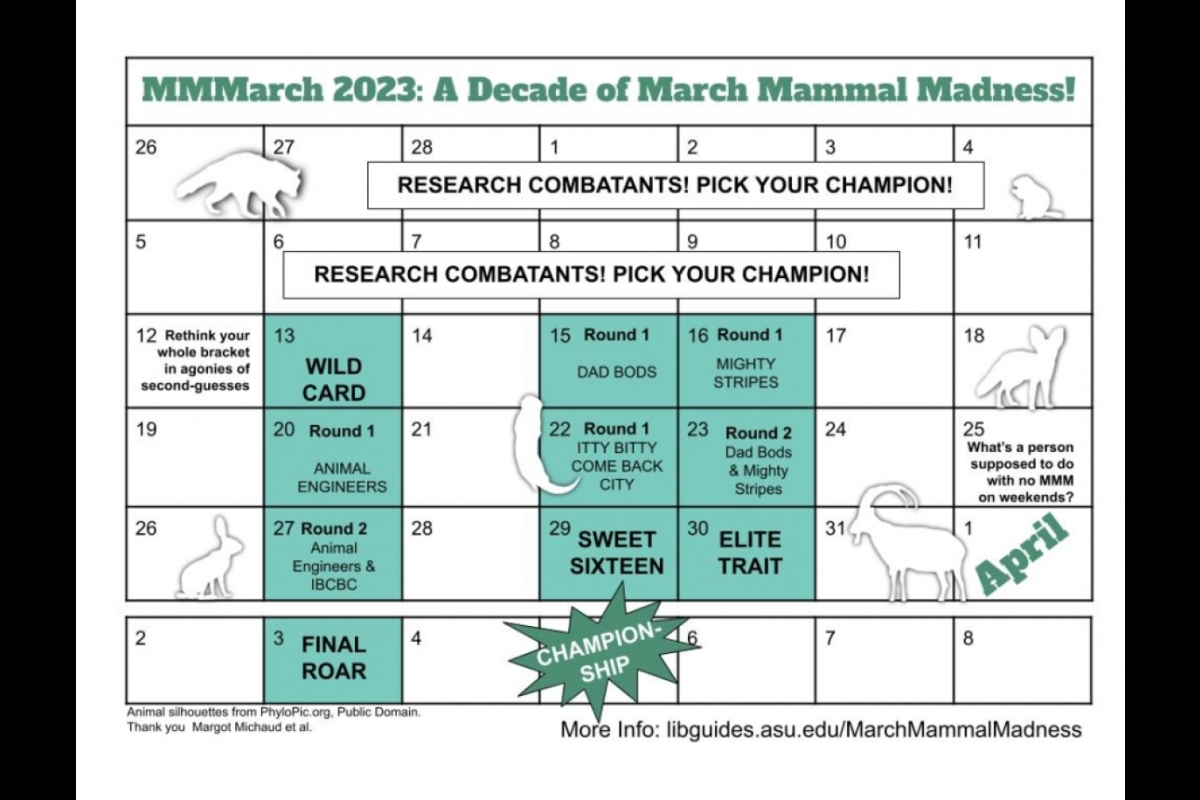March Mammal Madness tournament celebrates decade of science engagement

Illustration of a common treeshrew by Charon Henning
Editor’s note: This story is featured in the 2023 year in review.
The world’s most popular simulated animal tournament is back for another year of exciting matchups.
March Mammal Madness, which was established in 2013, celebrated a decade of science education, innovation and impact during a virtual event held on Feb. 16.
The event featured Katie Hinde, associate professor in the School of Human Evolution and Social Change and the Center for Evolution and Medicine at Arizona State University, and Anali Maughan Perry, head of Open Science and Scholarly Communication at ASU Library.
Hinde, who has continued to serve as March Mammal Madness editor in chief of a team of scientists, illustrators, conservationists, librarians, designers and educators, joined Perry to kick off this year’s tournament, which runs from March 13–April 5, with stories from the past decade and what players could look forward to this year.
Perry said that in 2016 she began following the tournament on Twitter after seeing scientists share articles and resources about different animals.
“There are so many things to love about March Mammal Madness,” Perry said. “I love animals. I love games. I love science, I like communicating.”
But she noticed that many of the links being shared were inaccessible behind paywalls or on platforms often blocked by K–12 schools.
“We needed to find ways of sharing resources that would be accessible to everybody, even if they weren't at an academic institution,” Perry said. “Having a resource that had a dot edu URL would make it a lot easier for educators to engage and visit.”
Soon after, a partnership with the ASU Library was formed to create the March Mammal Madness LibGuide.
Library guides, or “LibGuides” for short, are a platform used all over the world, where libraries can gather lists of resources in an organized and friendly way. Out of the more than 750,000 LibGuides in the world, March Mammal Madness is the 32nd most popular. The screen-reader compatible March Mammal Madness LibGuide provides everything you need to participate in the tournament, including videos, science resources, archived tweets and nightly matchup summaries.
Launching the 2023 tournament
More than 6,600 educators have already signed up to play in the March Mammal Madness tournament, and will have access to materials that will reach more than 660,000 learners.
The 2023 bracket dropped on Feb. 21 and features animals such as a golden eagle, a sea otter and Darwin’s frog.
For newcomers to the tournament, the saying is, “The mammals are the mammals and the nonmammals are the madness,” Hinde said.
The 2023 tournament includes a redesign of the LibGuide. Different portals break down the tournament by audience to help educators find the resources that are most appropriate for their corresponding age group. There are now areas for high school, college, middle school and K–5 students, and areas for families and homeschool groups.
“Now you can click to the portal that is most relevant for you,” Hinde said.
The importance of humor and storytelling in science
Perry and Hinde also talked about the importance of including humor in scholarly communications.
“In my field in scholarly communication, we see a lot about how people are engaging with and communicating their scholarly research,” Perry said. “I think it's always so much more interesting and exciting when scholarly authors include humor, and a little bit of their personality, in their writing.”
“I think one of the things that we lose sight of sometimes in science is that there's so much opportunity for joy and jokes and celebration within the scholarly community,” Hinde said. “And if you look at (articles) in the past, there are lots of hilarious writing and natural history articles, and clearly, there's a lot of humor. And it would be great if we could do more to bring that back.”
The MMM tournament provides an opportunity to bring humor and creativity into science engagement.
For example, this year's tournament features four divisions: Might Stripes, Itty Bitty Comeback City, Animal Engineers and Dad Bods.
The term “dad bods” celebrates the behavioral and physiological changes that happen to human fathers.
“What we're going to have is a division of species that have physical, behavioral, anatomical or morphological adaptations for paternal care or paternal investment,” Hinde said. “So we're going to have a division of high-investing dads. ... We're excited about some of the species that are going to be featured there of dads that just do some amazing infant care or care of young.”
The tournament helps reinforce learning not just in the classroom but also in life, thanks to its narrative approach.
“Using narrative for learning is actually one of the most effective ways to promote retention of knowledge,” Hinde said. “In many of our other school subjects, narrative is the standard, but it's not as typical in conventional education for science.”
“My kids have been doing March Mammal Madness with me for the last few years,” Perry said. “It's so funny what they remember. They pull stuff out of nowhere from three years ago, when they were six, and they still remember this event or this trait about a creature that they cared about.”
Lessons from the MMM community
Every year the team seeks feedback from the community and learns how educators are using the LibGuide and resources.
“The big lesson learned here is if you're doing science engagement, listen to your community,” Hinde said. “Listen, and join in your community to really be able to make sure that what you're doing fits. Not every element is going to fit every constituency, but the collective is going to be much better positioned with that, with that listening.”
Teamwork is also a crucial part of the experience.
“When you create something that's fun and engaging and inclusive, people love it, and they show up with their skill set,” Hinde said. “And they say, ‘Hey, I noticed that you might benefit from a LibGuide' or 'Here's a beautifully graphically designed bracket.’ And that I think is one of the most beautiful things about this tournament, is that having started a seed of something that was very small, that people have loved it, and that they have invested in it and helped it flourish.”
Video courtesy March Mammal Madness LibGuide/ASU Library
More Science and technology

ASU grad to use science to get an edge on crime
Editor’s note: This story is part of a series of profiles of notable fall 2024 graduates.As a child growing up in Pinetop, Arizona, Giavanna Caruth's family experienced a tragic loss in the early…

ASU graduate triumphantly crosses the finish line, overcoming all obstacles
Editor’s note: This story is part of a series of profiles of notable fall 2024 graduates.For Kayla Perry, earning a PhD in biochemistry was like competing in a high hurdles track and field event.…

ASU software engineers honor late cyclist with 'dashcam' for bikes
It was all Rob’s idea.In the months before his death, avid cyclist Rob Dollar spoke frequently with his father, John Dollar, about his desire to start a foundation to promote safer riding conditions…

